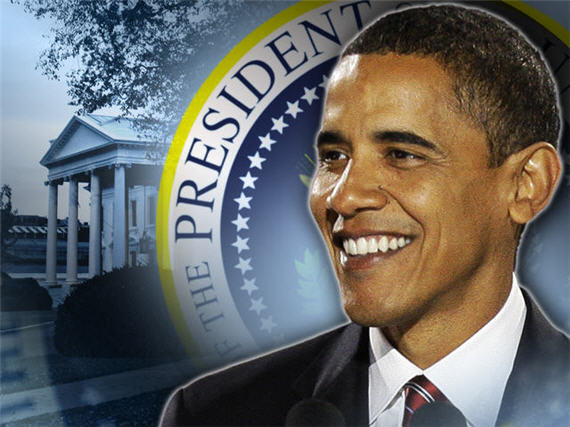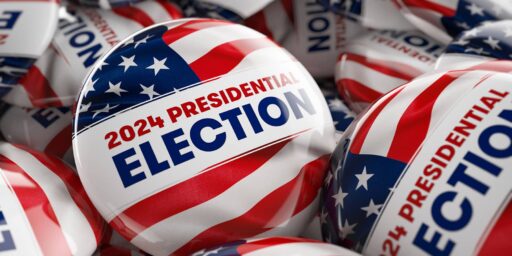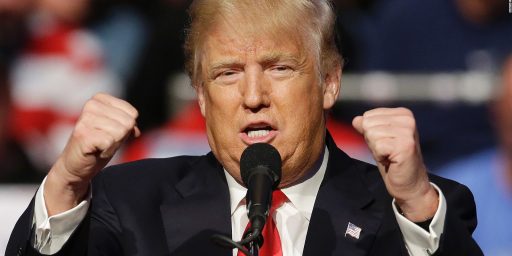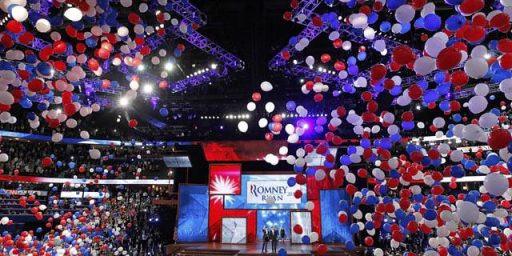Obama Re-Election Keys
A political scientist whose formula has correctly picked every presidential winner since 1984 says Barack Obama will be re-elected.
A political scientist whose formula has correctly picked every presidential winner since 1984 says Barack Obama will be re-elected.
Paul Bedard, US News (“Never-Wrong Pundit Picks Obama to Win in 2012“):
Allan Lichtman, the American University professor whose election formula has correctly called every president since Ronald Reagan’s 1984 re-election, has a belated birthday present for Barack Obama: Rest easy, your re-election is in the bag.
“Even if I am being conservative, I don’t see how Obama can lose,” says Lichtman, the brains behind The Keys to the White House.
[…]
Lichtman developed his 13 Keys in 1981. They test the performance of the party that holds the presidency. If six or more of the 13 keys go against the party in power, then the opposing party wins.”The keys have figured into popular politics a bit,” Lichtman says. “They’ve never missed. They’ve been right seven elections in a row. A number that goes way beyond statistical significance in a record no other system even comes close to.”
Lichtman’s earned quite the reputation. In 1992, it seemed likely former President George H.W. Bush would be re-elected, having reached historic highs in popularity after he launched a war that pushed Iraqi troops out of Kuwait. But Lichtman thought otherwise and that factored into former Arkansas Gov. Bill Clinton’s decision to challenge Bush.”I got a call from this woman with a thick southern drawl. It was Clinton’s special assistant. She wanted to know if it was true that a Democrat could win. I assured her it was and I sent Clinton a copy of my book and a memo and the rest is history.”
[…]
Below are each of the keys and how it falls for Obama.
- Party mandate: After the midterm elections, the incumbent party holds more seats in the U.S. House of Representatives than it did after the previous midterm elections. Says Lichtman, “Even back in January 2010 when I first released my predictions, I was already counting on a significant loss.” Obama loses this key.
- Contest: There is no serious contest for the incumbent party nomination. Says Lichtman on Obama’s unchallenged status, “I never thought there would be any serious contest against Barack Obama in the Democratic primary.” Obama wins this key.
- Incumbency: The incumbent party candidate is the sitting president. Easy win here for Obama.
- Third Party: There is no significant third party challenge. Obama wins this point.
- Short term economy: The economy is not in recession during the election campaign. Here Lichtman declares an “undecided.”
- Long-term economy: Real per capita economic growth during the term equals or exceeds mean growth during the previous two terms. Says Lichtman, “I discounted long term economy against Obama. Clearly we are in a recession.” Obama loses this key.
- Policy change: The incumbent administration effects major changes in national policy. “There have been major policy changes in this administration. We’ve seen the biggest stimulus in history and an complete overhaul of the healthcare system so I gave him policy change,” says the scholar. Another win for Obama.
- Social unrest: There is no sustained social unrest during the term. Says Lichtman, “There wasn’t any social unrest when I made my predictions for 2012 and there still isn’t.” Obama wins a fifth key here.
- Scandal: The incumbent administration is untainted by major scandal. “This administration has been squeaky clean. There’s nothing on scandal,” says Lichtman. Another Obama win.
- Foreign/military failure: The incumbent administration suffers no major failure in foreign or military affairs. Says Lichtman, “We haven’t seen any major failure that resembles something like the Bay of Pigs and don’t foresee anything.” Obama wins again.
- Foreign/military success: The incumbent administration achieves a major success in foreign or military affairs. “Since Osama bin Laden was found and killed, I think Obama has achieved military success.” Obama wins his eighth key.
- Incumbent charisma: The incumbent party candidate is charismatic or a national hero. Explains Lichtman, “I did not give President Obama the incumbent charisma key. I counted it against him. He’s really led from behind. He didn’t really take the lead in the healthcare debate, he didn’t use his speaking ability to move the American people during the recession. He’s lost his ability to connect since the 2008 election.” Obama loses this key.
- Challenger charisma: The challenging party candidate is not charismatic or a national hero. Says Lichtman, “We haven’t seen any candidate in the GOP who meets this criteria and probably won’t.” Obama wins, bringing his total to nine keys, three more than needed to win reelection.
Now, having successfully predicted seven successive presidential elections is mildly impressive but hardly indication that a model is brilliant. Most of the contests weren’t even close. Additionally, one could argue that Lichtman got 2000 wrong, since Gore got more overall votes than Bush and lost by virtue of a series of odd circumstances in Florida.[*]
That said, the “keys” here strike me as plausible indicators of incumbent re-electability. And I agree with Lichtman that Obama is the favorite to win re-election. Still, I’d argue that,
1. Weighing all the keys equally is problematic, especially when one issue is so absolutely dominating the agenda. The economy has never been this weak during the life cycle of Lichtman’s model. While Obama isn’t getting all of the blame for it, it gives any reasonable Republican challenger a puncher’s chance.
2. I’m not sure “policy change” is a plus for Obama. His health care plan may wind up being quite popular down the line but it was extremely controversial at the time. And, while I firmly believe any president would have agreed to something like his stimulus plan, it remains wildly unpopular.
3. It’s too early to score the Third Party and Scandal keys. It’s actually quite plausible that we’ll see a significant third party candidate this year; the real question is whether it will be one that hurts Obama or his challenger more. Obama’s administration has indeed been clean and he’s been quick to cut loose anyone who might be politically damaging; but one never knows.
___________
*UPDATE: Lichtmann actually picked Gore back in 1999, although he hedges his bets considerably. Additionally, as this excerpt suggests, the “keys” themselves have changed over the years:
Thus, the outcome of election 2000 turns on the thirteenth key. This is the still undecided incumbent party contest key, which falls unless the nominee of the incumbent party controls at least two-thirds of Convention delegates. Since 1860, this key has been the best single predictor of victory or defeat for incumbent Democratic administrations
Gore got 99.97% of the convention vote and carried 75.8% of the primary delegates, winning in all 50 states. But, certainly, Gore was not overly charismatic, much less a national hero.







I am happily going to use this “model” today in my research methods class. With enough ad-hoc thinking and subjectivity, one can “predict” anything.
James,
“It’s actually quite plausible that we’ll see a significant third party candidate this year; the real question is whether it will be one that hurts Obama or his challenger more.”
That was my thought on reading this list as well. In the extremely unlikely event Romney wins the GOP nomination, any third party challenger will be to his right and will help Obama. In the far more likely event that Perry or Bachmann wins, a challenger will likely be from the middle and could draw votes away from Obama, in the way Anderson drew votes away from Carter in 1980.
@Moosebreath: I can’t envision a scenario in which Bachmann wins. But, yes, Perry is the most likely winner with Romney the Establishment alternative.
By virtue of it weighting equally such fare as foreign policy mixups with (duh!) the economy this sort of tripe reminds me of the “Redskins” indicator of national elections. Remember that one? The outcome of the presidential election was determined by whether or not the Washington Redskins won their final home game before the 1st Tuesday in November.
There’s a very accurate and foolproof indicator of an incumbent president’s reelection chances and, not surprisingly, it relates to the economy at large and specifically to the job market.
Measure the unemployment rate in November of the year prior to the incumbent’s reelection bid. Measure the unemployment rate in October of the year in which he’s standing for reelection. If the latter is higher than the former the incumbent president loses; vice-versa. Apply that concept to every incumbent reelection bid since WWII. Voila. (The only outlier was the Ford-Carter election in 1976; of course Ford was not an elected president nor an elected vice president. Also, unemployment still was very high in the fall of 1976, along with inflation.)
Now, having said all that, even the job market might not necessarily predict the outcome of next year’s election. We’re in uncharted waters. This is the first “affirmative action” presidency. The public is a lot dumber now than they were even 10 years ago much less 20 or 30 years ago. The mass media has become so numbingly biased it boggles the mind. Non-voting conservatives have become so irrational and so recalcitrant it boggles the mind. Young voters not only are more idiotic they’re more partisan. The black demographic votes even more in lock step than in previous decades. So on, so forth.
Obama already is the worst president in the history of the republic. Yet it’s quite possible, perhaps even quite likely, he’ll be given a 2nd term in office.
@James Joyner: I still think Perry is a flash in the pan. The Republican voters were looking for a different candidate and got one. As he comes under increasing scrutiny he will fade.
I think his keys are a pretty good rule of thumb and I continue to think that President Obama is likely to be re-elected.
However…
Dr. Lichtman has several glosses in his remarks that put his findings on shakier ground.
2. Don’t primary challenges tend to emerge later rather than earlier?
4. And third party challenges even later?
5. Declaring the short term economy “undecided” is handwaving.
8. What is the unit of measure of “social unrest”?
9. I can think of at least three brewing scandals for the Obama Administration. Whether they will amount to anything or not and when are the questions.
10. “Mission Accomplished!”
The bottom line on my remarks is that timing is everything and, as you note, it’s just too early to tell.
James,
“Perry is the most likely winner with Romney the Establishment alternative.”
I think you are both significantly overestimating the effect the Establishment will have on this primary, and significantly overestimating Romney’s appeal once votes are actually counted. Other than New Hampshire, the early voting states are poor ones for the Establishment, and an insurgent (whether Perry, Bachmann or someone else) could easily sweep through Iowa, South Carolina, Florida and Nevada, setting that person up as the inevitable nominee.
Further, Romney has so much baggage from the Republican primary voter’s POV that I cannot see how he has the slightest chance. If Perry flames out, and Bachmann does as well, and none of the other insurgent candidates catch fire, then I expect the Establishment to rally behind someone else (Ryan, Christie, etc.).
Or to put it more briefly, I cannot envision imagine a scenario where Romney wins.
So who did he pick in 2000?
Given that all of these “keys” seem to refer to factors that would influence opinions nationwide, rather than on any state-wide or regional basis, it seems that what his method would do is to predict a winner of the popular vote. Gore, of course, won the popular vote, and probably would have won the Florida and the electoral vote as well if all those Palm Beachers didn’t screw up their butterfly ballots.
If he predicted a Bush victory, then I can’t really see that counting in his favor.
@Tano: Yup. Noted that in the post, actually.
@Dave Schuler: Apparently, “social unrest” means actual violence in the streets al’a the civil war or the worst of the civil rights struggles. As such, it’s really been meaningless over the test period.
In addition to the “hand waving” over the economy, I’m bemused as to the standard used to define “incumbent charisma” that Obama doesn’t meet it. I’d say charisma was 90 percent of his appeal in 2008, and I don’t mean that unkindly.
@Tano:
I’ve read (sorry can’t find a citation) that Lichtman’s claim is that his model will predict who will win the popular vote and he picked Gore in 2000.
@Tsar Nicholas II:
hear that, buchanan, wilson, and hoover? you guys got nothin!
delusion aside, i have to agree that i find these kinds of predictors to be dubious, especially 16 months out. lets see who the republican opponent is and how the economy is doing in the summer of ’12 before we start making predictions.
What is important predicting who wins the popular vote or who wins the election?
He predicted Gore in 2000 to win. Yes he won the popular vote but lost the Presidency. Many of the Keys seem subjective to me.
Can anyone show me him predicting the winner before the elections? I found one predicting Gore and many on Obama election and reelection. However I haven’t found any predicting Republican victories or even Bush 1 prior to his defeat. I found many after the facts article but very few prior. How about a link to the breakdowns of those keys for each election?
This strikes me more on the line the Washington Redskin prediction models. It is good for entertainment purposes but not much else.
I found one on Bush in 2004 but he was hedging his prediction on that one. The 2004 wasn’t even that close. Small sample side on him predicting the future right.
Mr. Lichtman ignores the “belief key,” that 25% of the population that “believes” the President is (pick your favorite clown picture here). Belief has overridden all else in what passes for conservative thought. It skews reason, and casts shadows where there were none before. The most conservative need this belief because without it, the accumulation of unacknowledged facts would simply short out the circuitry to know it.
Stupid cannot be cured in a day. But putting up with it can stop this very moment.
@Tsar Nicholas II: You have no end of criticism for the President, so much one wonders if you are paid to have it. That aside, what is completely missing from your rhetoric is the case for why any of the present candidates ought to be elected. What conservative governing successes will that candidate run on? What conservative ideas for the future will win back alienated voters?
Very soon now, this is going to turn into a Math exercise. If we submit Obama will not take any new states from those he won in 2008, which states, exactly, will be taken back by the GOP? This is where the road gets very rough very quickly, because Obama has many pathways to victory, where the GOP has to climb uphill all the way. WI came off the table thanks to Gov. Walker. The same overreach puts OH in serious play.
For example, if the GOP cannot take Florida, the night is over. Obama can lose it and still win any number of ways.
I know math handicaps many of my conservative friends, but your rhetoric is soon going to have to start convincing people why Mittens or Perry would not be worse. Bashing the president (and by extension, the Presidency) is about as fresh as “take my country back.”
@Wayne:
Maybe he should add another key: “Supreme Court Shenannies”
@Sam
Yeah and I bet the referees\umpires are the reasons your sports teams losses to.
I have been writing about this forever to very little response. I actually buy most of what Lichtman writes. Also, with regard to 2000, if you actually read Lichtman’s original 1984 book you will see that he originally only professed to predict the popular vote which makes him correct in 2000 (even if you discount the Supreme Court). As far as it being too “early” for certain keys, Lichtman only claims that the keys are an accurate indicator prior to the election and usually just post-convention. Anything before that should be construed as an “if the election were today” type prediction, so Lichtman himself says that while things work out most of the time well in advance, it would indeed be to early to say. Not exactly a criticism.
@Wayne: If you read the edition published after 1988 he cites the predictions in periodicals that he had made prior to the elections. They are out there.
***Footnote: Lictman isn’t exactly considered and outlier with this concept. I picked it up after reading about Lee Atwater’s affinity for the concept, but he doesn’t make the predictions for Mother Jones. One can find them if they look.
@Talmadge
I am not saying that they keys are not key indicators. However most are very subjective. It would be easy to shoehorn in a key as being positive or negative dependent on the outcome. It is an old fortune teller trick. Make things sound specific but have them vague enough that you can fill in the blanks later.
For example, if Obama loses Allan can claim that his formula still work once some final adjustments are made. Like the Tea Party would be considered as sustain civil unrest if they are active in the next election.
Also often pollsters and other systems will predict different results at different times as well as not release the final prediction until after the event. That way when the results are in, they can go back and choose which prediction they were right on. Of course they ignore the rest.
That is why I ask for publications of predictions that were posted prior to the events and not after. Preferably all predictions prior.
I am away on for work right now and don’t have my copies of the book, but I can post some citations when i return home Sunday. That is if I can round up a copy.